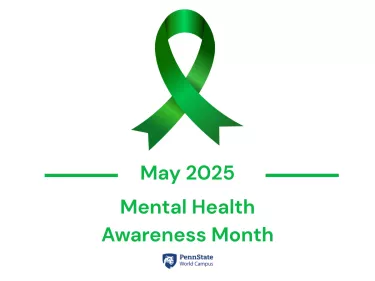Mental Health Awareness Month: Resources to Support Your Well-Being

May is Mental Health Awareness Month, so we wanted to take this opportunity to discuss why it’s important to make your mental health a priority — and make sure you know about the resources available to Penn State World Campus students.
Mental Health Awareness Month 101
Mental Health America, originally named National Association for Mental Health, designated May as National Mental Health Awareness Month to raise awareness of and decrease the stigma associated with mental illness. This designation began in 1949 and continues to be recognized annually.
Removing the stigma of discussing mental health

If you have mental health challenges or concerns, you are not alone. According to Mental Health America:
- one in five American adults will have a diagnosable mental health condition in any given year
- an estimated 23.1 percent of U.S. adults have a mental illness
- 46 percent of Americans will meet the criteria for a diagnosable mental health condition sometime in their life. Half of those people will develop conditions by the age of 14.
However, more than half of those Americans do not receive treatment for their conditions and many aren’t even comfortable disclosing their experiences of mental illness with their loved ones. This is mainly due to the stigma that is associated with mental illness. Education is the key to reducing this stigma. All of us deserve to feel comfortable accessing the care that we need.
A survey conducted by U.S. News/Generation Lab in March 2024 found that 70 percent of college students reported that they struggled with mental health since starting college. Many students struggle but do not seek help. According to the report, only 37 percent of the students surveyed searched for mental health resources at their college.
Services and resources available to students
There are resources available 24/7 to all students for emergency and crisis services.
Nationally, in the United States:
- Penn State Crisis Line: 1-877-229-6400 or text LIONS to 741741
- 988 Suicide & Crisis Lifeline
You do not need to be in urgent need to access these services. You can call, chat, or (in many cases) text to just ask questions or talk through a difficulty. First and foremost, staff members will ensure that you are safe, as that is their primary role. They can also direct you toward the care that you need. Remember that ALL mental health services are confidential, unless there is significant risk involved and someone’s safety needs to be assured.
International students can review International Crisis and Emergency Services listings, which include global crisis hotlines and resources in specific countries around the world.
How Student Affairs can help
World Campus Student Affairs Case Management Services are a great starting point for students who need whole health support. Our case managers can identify services and resources available locally, regionally, nationally, and globally, and they are also experienced at helping students navigate complex health care systems and networks. A case manager can help you determine your next steps based upon your goals and desired outcomes. It’s important to note that case managers do not provide services directly; they link you to services and resources. The options case managers can suggest may be limited by what insurance companies and networks will allow, but our staff can often help eliminate the barriers to receiving care and guide students toward their desired path of wellness.
Some students may prefer a more self-directed approach by accessing the mental health and wellness tools and resources available on the World Campus website. Others may benefit from virtual life coaching and therapy services. Our mental health case managers can provide a referral to Headspace Care that gives World Campus students free access for a year. Please schedule an appointment with Case Management if you are interested.
Case Management Services are available to all World Campus students Monday through Friday, 8:00 a.m.–5:00 p.m. (ET), and can be scheduled at your convenience by using the following link and password:
- World Campus Mental Health and Wellbeing Case Management Scheduling Form
- To access the form, use the following password: WCCMforms
Important things to remember
A few things we want to emphasize:
- It is okay to ask for help. You are not alone! Taking the first step to seek help is a brave decision.
- It is also okay to ask someone else if they need help. You may be able to provide support and guide them to important resources.
- Get engaged to educate yourself and your loved ones and help reduce the stigma associated with mental illness. You can make a difference!
Other helpful resources:
- Support Your Health and Wellness with These Student Services — this blog post reviews some of the wellness services available to Penn State students
- Surviving Final Exams with Minimal Stress — quick tips for managing the stress many students feel before a test or exam